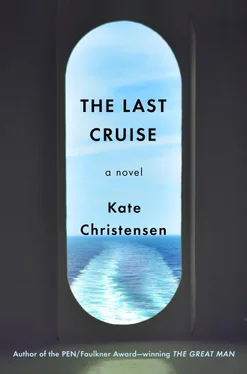“Go down to the lifeboats,” she shouted when she saw Mick. Her cheek was gashed and bleeding. She looked pocket-size, ancient. Her life vest was huge on her. Her twiglike arms stuck out of the armholes. “He’s making the announcement right now.”
“Why aren’t you down there?” he asked her, lurching across the room to stand next to her.
“I’m going soon. The crew is too. Everyone needs to get to their muster stations. There’s a U.S. Navy ship coming to pick us all up, just three hours away.”
“Why aren’t you down there?” Mick repeated.
“Go and get into a boat,” said Kimmi.
He turned and staggered toward the door as an old, white-haired man entered, out of breath, soaking wet, his clothes and head smeared with something tarry and black. “I just came from the engine room,” he shouted to the crewmembers. “There’s a crack in the hull, it’s coming in from everywhere, there are crewmembers still down there.”
An enormous wave hit the ship. They all went stumbling and hurtling across the bridge. Mick hit the control panel so hard he chipped a tooth. He went temporarily deaf. His arm went numb. He looked at the others. They looked as dazed as he felt, checking themselves for damage to their bodies and faces. A crewmember helped the captain off the floor, back into his chair. Outside, it was impossible to tell what was happening. Sea and sky had merged, and there was no up or down. Mick’s shoulder throbbed. Maybe he’d torn something in there. He stuck his tongue against his chipped front tooth and ran it over the new sharp edge.
“Time to go down,” Kimmi shouted.
Another person had come in, an older woman. When she saw the white-haired man, she gave a cry and rushed to him and flung her arms around him. “There you are, oh, Sasha! Thank God I found you. I looked by the lifeboats and you weren’t there.”
“I was in the engine room,” the man said. “We’re leaking, I have to go back down.”
“No. You come with me,” she said fiercely. “We’re going to the lifeboats.”
“Where are Isaac and Rivka?”
“Down at the muster station. I came to find you. I won’t leave without you.”
Mick was making another attempt to stagger toward the door when Christine burst in on a fresh wet gust of wind. “Good morning!” she shouted.
He couldn’t believe his eyes.
“Hello!” he shouted with half-hysterical, giddy abandon. “Beautiful day, isn’t it?”
Christine laughed, beaming at him with a jaunty hilarity that was completely at odds with their predicament. Mick felt a rush of love for her so intense he thought his heart might explode. Swimming through the pitching air, he threw his arms around her. She hugged him back hard. They stood for a moment, swaying with the force of their contact. Her body felt strong and warm. He never wanted to let her go.
“When we get off this ship,” said Mick into her hair.
She pulled back to look into his face as the ship bucked again. “Yes,” she said clearly. Holding on to each other, arms tightly around each other’s waists, they each shot out a hand to steady themselves on the console panel, tumbling into the elderly couple.
“Miriam!” cried Christine. “Sasha!”
“It’s you!” said Miriam. “Go downstairs!”
The wind died abruptly. The rain all but stopped. The ship went quiet. It was just the pitching waves, the roar of the surf, far below. The air in the room was charged with negative ions, dim and cool and humid.
Kimmi came to stand at the console with Mick and Christine, Sasha and Miriam, the five of them shoulder to shoulder, looking out through the salt-crusted windows at the wild foam and water, expectantly, as if they were all waiting for something.
“They made us read a horrible thing in Bible school when I was a kid,” said Kimmi, out of nowhere. Her face glowed in the stormy light. “Revelation 8:8: ‘And the second angel poured out his vial on the sea; and it became as the blood of a dead man: and every living soul died in the sea.’ ”
“That’s terrible,” said Christine.
“I know,” said Kimmi. “What the heck kind of story is that to tell small children?”
“The Song of Miriam is better,” said Miriam. “That’s a song of redemption and hope. I loved the way you sang it.”
The Isabella moaned and gave a little heave to port, rocked by a monster swell.
“Listen to her,” said Kimmi. Her teeth were chattering, not from cold, Miriam thought, but from a strange excitement. Miriam felt it too. “All night, I kept telling her, ‘You can do it, Izzy, just hold it together, come on!’ ”
While Kimmi talked, the ship was hit by another wave, smaller than the last one, but still powerful enough to make the ship lurch. Mick tightened his grip on the hand railing below the console. He felt something wrench and twinge in his right shoulder. He held on so tightly his knuckles cracked as the ship slowly, shudderingly righted herself again and everything quieted.
“No way,” said Kimmi. “Over there. Look!”
They all looked in the direction she was pointing. Far away, a streaming bolt of sunlight lit up a patch of stormy ocean, the rain and spray creating a dazzling column of air, shimmering almost gold.
“It looks like the ladder to heaven,” said Christine.
They all laughed, no one knowing quite why, apart from the fact that it felt good to laugh.
“We can’t climb it,” said Sasha.
“But what a beautiful sight,” said Miriam.
Just as quickly as it had appeared, the faraway shaft of sunlight was swallowed again by the clouds. But somehow the air on the bridge seemed brighter. It was so quiet, they could hear the ocean running against the hull far below. The Isabella listed, just a little, but they all felt it.
“Are you guys ready to go downstairs?” said Kimmi. “We should go.”
“What is that?” said Christine. She was staring straight ahead at a wide, dense, blue-black mountain of a wave veined with white coming toward them. It grew as it came and filled the windows until it blotted out the storm. The Isabella tilted upward, rising easily into the air as if a hand had reached down and lifted her from the sea.
“Here we go,” said Mick.
He held his breath and felt a swooping in his stomach as the ship climbed the marbled face of the wave, up and up. The Isabella seemed to balance on the crest, trembling and weightless. The windy green-and-white foam disappeared and the whole world went gray and silent.
Mick looked at Christine in the sudden hush. Her mouth was open, her face astonished and full of anticipation. He wished he could stay up here with her forever, and never come down.
Kate Christensen is the author of six previous novels, most recently The Astral, and the memoirs Blue Plate Special and How to Cook a Moose. The Great Man won the 2008 PEN/Faulkner Award for Fiction. She has written reviews and essays for numerous publications, including The New York Times, Vogue, Elle, The Wall Street Journal, and Food and Wine. She lives with her husband in Portland, Maine.
In the Drink
Jeremy Thrane
The Epicure’s Lament
The Great Man
Trouble
The Astral
Blue Plate Special
How to Cook a Moose

What’s next on your reading list?
Discover your next great read!
Get personalized book picks and up-to-date news about this author.
Sign up now.
Читать дальше













